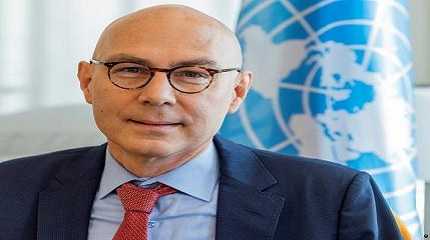
UNITED NATIONS, Jun 18 (APP): The UN High Commissioner for Human Rights, Volker Turk, has called on everyone to work together to build a more respectful and civil world, and for effective action to end hate speech.
“We know that the spread of hate is used by those who want to sow divisions, to scapegoat and to distract from real issues. Social media is a remarkably fertile ground for hate speech, providing it with both unprecedented reach and speed. And hate breeds bigotry, discrimination and incitement to violence,” Turk said, marking International Day for Countering Hate Speech on Sunday,
“What must be done? There is no silver bullet, no switch to flip that will rid our world of hate, online or offline. But with targeted and well-resourced measures, we can succeed in limiting its spread, isolating and holding accountable hate-mongers, and building greater respect.”
Globally, the spread of hate speech-related laws being misused against journalists and human rights defenders is almost as viral as the spread of hate speech itself, the UN Human Rights Chief said. Broad laws – that license States to censor speech they find uncomfortable and to threaten or detain those who question Government policy or criticize officials – violate rights and endanger essential public debate.
Rather than criminalizing protected speech, we need States and companies to take urgent steps to address incitement to hatred and violence, Turk said.
The High Commissioner called for multifaceted and well-resourced efforts, including:
— Ratcheting up investment in efforts to combat hate speech in languages other than English, and detecting and pivoting greater attention and investment to fragile contexts, or where early warning signs demand;
— Listening to those most affected by hate speech, and providing better channels for them to raise concerns and get prompt action;
— Holding companies responsible for what they are – and are not – doing to respect human rights, including by requiring human rights due diligence with regard to their operations and increasing transparency around hate speech policies and practices;
— Empowering expanded research into how to effectively combat hate speech through greater transparency, including by open or affordable API (Application Programming Interface)access;
— Providing support to those whose mental and physical health are seriously affected by incitement to hatred and violence, particularly the well-documented harms caused to women and girls by gender-based hate;
— Investing in digital and media literacy programmes, human rights education, and supporting mechanisms to provide independent fact-checking with the participation of journalists and civil society.
“More also needs to be done to address mega-spreaders – those officials and influencers whose voices have profound impact and whose examples inspire thousands of others,” Turk said. “We must build networks and amplify voices that can cut through the hate.”
Earlier, UN Secretary-General Antonio Guterres called for efforts to curb online hate and invest in social cohesion.
“Hate is a danger to everyone – and so fighting it must be a job for everyone. We must collectively strengthen our defenses,” the top UN official told the Security Council meeting on “the Values of Human Fraternity in Promoting and Sustaining Peace.”
“We must reign in the hate that is spreading online,” said the secretary-general.
The UN chief underscored that hate “fuels humanity’s worst impulses,” noting that it is a catalyst for polarization and radicalization and a conduit for atrocity crimes.
“It is also a result of these crimes, contributing to horrific cycles of violence that can churn for decades. It greases the wheels of violence, frays the social fabric, and corrodes the pillars of stability. It is, in short, often the bloody heart of the conflict,” Guterres elaborated.
“And as part of Our Common Agenda, we are working on a Global Digital Compact for an open, free, inclusive, and secure digital future for all, firmly anchored in human rights and nondiscrimination,” he added.
The secretary-general called for efforts to “move toward evermore multi-ethnic and multi-religious societies” and “invest in social cohesion.”




